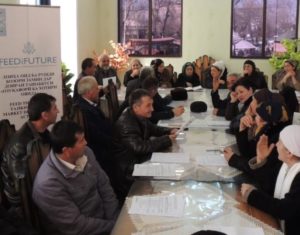
Land Market Development Activity
“The Feed the Future Tajikistan Land Market Development Activity recently commenced its activities, and it means that our farmers again have the opportunity to receive project support, obtain necessary information, and protect their land use rights,” says Mr. Rahmatullo Bobomurodov, head of the public organization “Shabakai tashabbuskoron” in the Khatlon region.
Tashabbuskors are local activists in jamoats who provide informational assistance to farmers. Tashabbuskors organize round tables and meetings with local government officials, and refer farmers to Legal Aid Centers to resolve land disputes.
In January 2017, Mr. Bobomurodov and his fellow tashabbuskors held a meeting and decided to continue their work as a formal network. Through the support of the Feed the Future Tajikistan Land Market Development Activity, they established their own public organization called “Shabakai tashabbuskoron,” and registered it with the Department of Justice on March 17, 2017.
The network’s main goal is to organize tashabbuskors’ activities in all jamoats of the 12 districts of the Khatlon region. They conduct information work on land issues in Tajikistan and increase awareness of farmers on their land use rights. Official registration of the tashabbuskors’ network will increase their capacity to independently carry out their work in jamoats.
Currently there are more than 40 tashabbuskors throughout the 12 districts, and the organization is planning to consider new members. The newly established organization will cooperate with the Feed the Future Tajikistan Land Market Development Activity to conduct round tables and meetings with farmers and local government officials, refer farmers to Legal Aid Centers, and continue to provide consultation for farmers and increase their land use rights awareness.
Reflecting on his experience as a tashabbuskor, Mr. Bobomurodov said, “I am proud of having chosen this path. Due to the support of the Feed the Future Tajikistan Land Market Development Activity, I am able to guide dehkans, provide citizens with information on new regulations adopted in the country in a timely manner, and — most importantly — help to solve land-related issues that dehkans face.”

